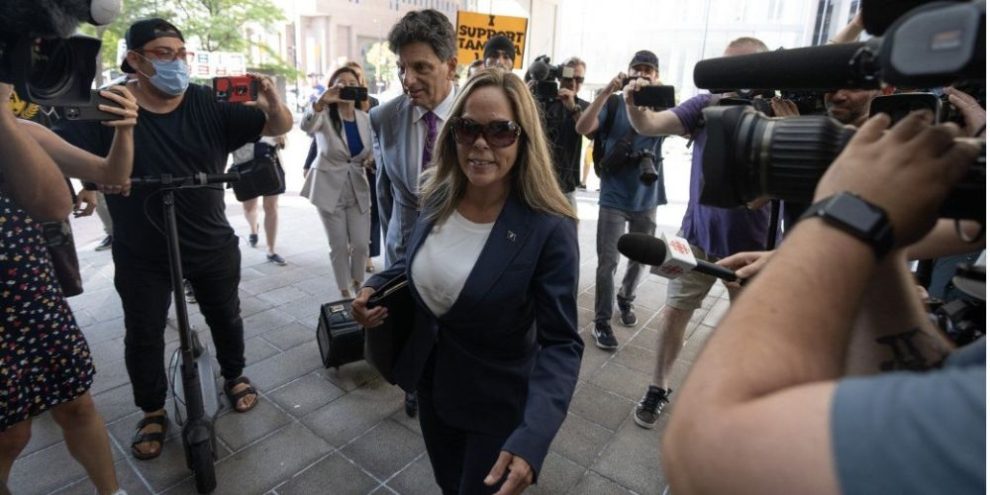
By Laura Osman in Ottawa
"Freedom Convoy" protesters were resistant to clearing the streets along Parliament Hill last year as lines of police in crowd-control gear attempted to push them out, a Quebec provincial police officer told an Ottawa courtroom Monday.
Capt. Etienne Martel with Sûreté du Québec took the stand through a French interpreter in the criminal trial of Tamara Lich and Chris Barber, who are facing charges related to their role in the 2022 protest.
The two were among the original organizers of the demonstration, which blockaded streets and intersections around Ottawa for three weeks in protest against COVID-19 public-health restrictions, vaccine mandates and Prime Minister Justin Trudeau's government.
Martel led a squad of more than 45 officers who assisted Ottawa police in trying to disperse the crowds in the final days of the three-week protest.
His squad was on the front line on Feb. 18 as police advanced slowly down Wellington Street toward Parliament Hill, face-to-face with a large crowd of protesters that outnumbered police.
Though Barber and Lich were both arrested before the police demonstration began, the Crown hopes to prove that they encouraged the crowds to "hold the line" as police ordered protesters to leave the area around Parliament Hill.
The Crown and the defence both took the court through several videos of the police operation. which stretched over two days. Some showed Martel's squad on the front line as a crowd of demonstrators refused to move, and shouted "hold the line" and "freedom."
In another video, a voice appears to speak out of a police radio and orders officers to "hold the line."
Barber's lawyer, Diane Magas, confirmed that Martel himself gave that order to his own officers twice during the operation.
"You told officers to hold the line, to not move forward," Magas put to Martel.
"Exactly," he responded through a translator.
Magas has said that she intends to argue that the phrase can mean different things to different people, and that when Lich and Barber told supporters to "hold the line," they weren't necessarily encouraging illegal behaviour.
When the Crown asked him to clarify what he meant, Martel told the court, "in the context of that event, it was not to move."
Martel testified attempts to move protesters off the street was slow going as protesters refused to leave.
"The reason that we were going slowly is because it was a heavy presence of demonstrators that prevented us from moving forward," Martel told the court through an interpreter.
At times, the demonstrators yelled and pushed back against police, he said, but they didn't throw any projectiles.
His group barely managed to advance 150 meters by late that evening on the first day of the demonstration, Martel said.
Magas pointed out it would have been difficult for Martel to see what the crowd was doing on the other side of the police line from where he was standing, several meters behind his squad.
She played a five-minute video that showed Martel's approximate vantage point during the operation, which pictured him far back from the action.
She asked if he recalled scenes from the videos that showed protesters singing the national anthem or holding signs promoting peace.
He said there was so much going on that he didn't take in those exact details.
Banner image: THE CANADIAN PRESS/Adrian Wyld
This report by The Canadian Press was first published Sept. 18, 2023.





